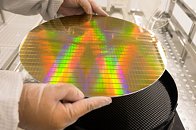Wednesday, October 16th 2019

TSMC Extends 16 nm Lead Time, Possibly Because the Fab is Swamped
TSMC has increased its 7 nm delivery time by as much as three times because of extra demand from customers who want their products made on 7 nm manufacturing process. While we thought the struggles with the delivery of 7 nm will only be present for that node, it turns out that TSMC is facing some issues with the delivery of its 16 nm node as well.
There is no clear indication of why is TSMC having issues meeting demand for its 16 nm node, just now. What might be the reason is that a large number of manufacturers are still designing and manufacturing their products on 16 nm, as it is quite cheaper than smaller nodes, so the 16 nm manufacturing facilities may be "overloaded". Another possible reason is that wafer output faced some issues that are now affecting both the 7 and 16 nm node delivery time being extended. That can be anything from a small power cut to a large issue like contamination of cleanrooms where processors are made.
Source:
DigiTimes
There is no clear indication of why is TSMC having issues meeting demand for its 16 nm node, just now. What might be the reason is that a large number of manufacturers are still designing and manufacturing their products on 16 nm, as it is quite cheaper than smaller nodes, so the 16 nm manufacturing facilities may be "overloaded". Another possible reason is that wafer output faced some issues that are now affecting both the 7 and 16 nm node delivery time being extended. That can be anything from a small power cut to a large issue like contamination of cleanrooms where processors are made.

12 Comments on TSMC Extends 16 nm Lead Time, Possibly Because the Fab is Swamped
PS. This has to be rectified, because it is common mistake to see Taiwan as independent country.
However, it is mostly free and mostly democratic, I ought to have something of an idea about it, since I live there...
Jokes aside, this is not the first time TSMC having some trouble delivering, thats just kinda surprising for me amidst ongoing trade war.
One of the reason for smaller stepping is to cut the costs.
For example intel is still on 14 nm. If you want to follow the big picture you should actually watch intel's manufacturing costs.
As intel must add more silicon for the same amount of money these costs should go up.
I was not able to google it so more research is needed than what I have time for. :)